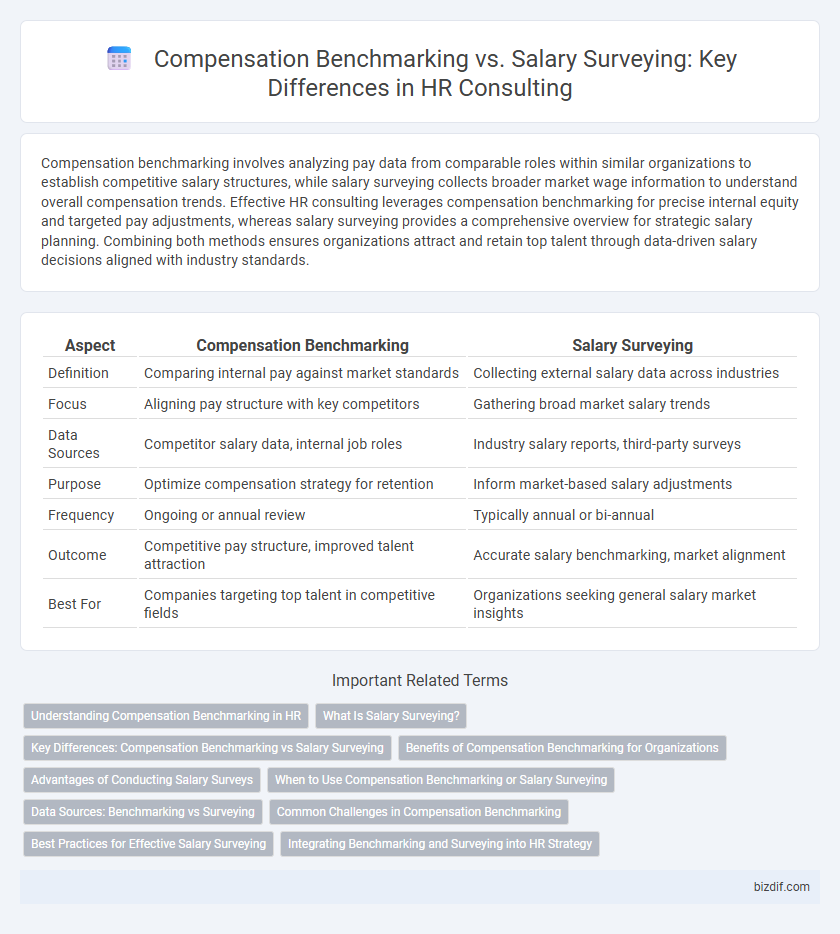Compensation benchmarking involves analyzing pay data from comparable roles within similar organizations to establish competitive salary structures, while salary surveying collects broader market wage information to understand overall compensation trends. Effective HR consulting leverages compensation benchmarking for precise internal equity and targeted pay adjustments, whereas salary surveying provides a comprehensive overview for strategic salary planning. Combining both methods ensures organizations attract and retain top talent through data-driven salary decisions aligned with industry standards.
Table of Comparison
| Aspect | Compensation Benchmarking | Salary Surveying |
|---|---|---|
| Definition | Comparing internal pay against market standards | Collecting external salary data across industries |
| Focus | Aligning pay structure with key competitors | Gathering broad market salary trends |
| Data Sources | Competitor salary data, internal job roles | Industry salary reports, third-party surveys |
| Purpose | Optimize compensation strategy for retention | Inform market-based salary adjustments |
| Frequency | Ongoing or annual review | Typically annual or bi-annual |
| Outcome | Competitive pay structure, improved talent attraction | Accurate salary benchmarking, market alignment |
| Best For | Companies targeting top talent in competitive fields | Organizations seeking general salary market insights |
Understanding Compensation Benchmarking in HR
Compensation benchmarking in HR involves analyzing and comparing an organization's pay structures against industry standards to ensure competitive and fair employee remuneration. Unlike salary surveying, which primarily collects raw salary data, benchmarking interprets this data to align compensation strategies with business goals, talent acquisition, and retention. Effective compensation benchmarking helps companies maintain market competitiveness, improve employee satisfaction, and comply with regulatory requirements.
What Is Salary Surveying?
Salary surveying involves the systematic collection and analysis of compensation data from multiple organizations within a specific industry or region to determine competitive pay rates. This process helps HR professionals gather market-driven insights on salary ranges, benefits, and incentive structures to inform equitable and attractive compensation packages. Salary surveying provides detailed benchmarking information that supports strategic decision-making in talent acquisition and employee retention.
Key Differences: Compensation Benchmarking vs Salary Surveying
Compensation benchmarking involves analyzing internal pay structures against industry standards to align employee salaries with market rates, ensuring competitive and equitable compensation. Salary surveying collects raw salary data from various organizations to understand wage trends and ranges within specific job roles or sectors. The key difference lies in compensation benchmarking's strategic focus on internal alignment and market positioning, while salary surveying primarily provides external market salary data without contextual internal analysis.
Benefits of Compensation Benchmarking for Organizations
Compensation benchmarking provides organizations with precise market data that enables competitive salary structuring, attracting top talent and reducing turnover rates. It offers tailored insights into industry-specific pay trends, ensuring equitable and compliant compensation practices aligned with organizational goals. This targeted analysis enhances decision-making efficiency and supports strategic workforce planning.
Advantages of Conducting Salary Surveys
Conducting salary surveys provides HR consulting firms with up-to-date market data, enabling accurate compensation benchmarking that attracts and retains top talent. These surveys offer granular insights into industry-specific salary trends, benefits, and bonus structures, allowing organizations to design competitive and equitable pay packages. Access to reliable, real-time compensation data enhances strategic decision-making and strengthens alignment with market conditions.
When to Use Compensation Benchmarking or Salary Surveying
Compensation benchmarking is ideal when an organization seeks to align its pay structure with industry standards to maintain competitiveness and attract top talent, especially during salary revisions or policy updates. Salary surveying is more effective for gathering current market pay data across specific roles, helping HR teams understand detailed compensation trends and identify pay gaps. Use compensation benchmarking for strategic pay positioning and salary surveying for tactical, role-specific salary analysis.
Data Sources: Benchmarking vs Surveying
Compensation benchmarking relies on internal company data and industry-specific salary reports to establish competitive pay standards, ensuring alignment with organizational goals. Salary surveying gathers broad, external market data from multiple companies, providing a comprehensive overview of current compensation trends across industries. Both methods utilize distinct data sources that influence accuracy and relevance in setting effective compensation strategies.
Common Challenges in Compensation Benchmarking
Common challenges in compensation benchmarking include data accuracy, relevance, and timeliness, which directly impact the effectiveness of salary structures. Ensuring that benchmark data reflects current market conditions and comparable roles is critical to avoid compensation mismatches. Organizations often struggle with limited access to reliable industry-specific salary data and difficulties aligning internal pay scales with external benchmarks.
Best Practices for Effective Salary Surveying
Effective salary surveying in HR consulting requires selecting representative peer groups and ensuring data accuracy through reliable sources. Employing consistent job matching techniques and validating market data against internal roles enhances compensation benchmarking accuracy. Regularly updating survey data and leveraging technology-driven analytics enable informed decision-making that aligns pay structures with market trends.
Integrating Benchmarking and Surveying into HR Strategy
Integrating compensation benchmarking and salary surveying into HR strategy empowers organizations to establish competitive and equitable pay structures based on market data and internal alignment. Using benchmarking allows HR to compare compensation against industry standards while salary surveys provide real-time insights into employee expectations and market trends. This integration supports informed decision-making, enhances talent attraction and retention, and ensures compensation strategies remain aligned with business objectives and market dynamics.
Compensation Benchmarking vs Salary Surveying Infographic

 bizdif.com
bizdif.com